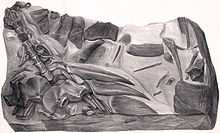Paleontology, palaeontology or palæontology (from Greek: paleo, "ancient"; ontos, "being"; and logos, "knowledge") is the study of prehistoric life forms on Earth through the examination of plant and animal fossils.[1] This includes the study of body fossils, tracks (ichnites), burrows, cast-off parts, fossilised feces (coprolites), palynomorphs and chemical residues. Because mankind has encountered fossils for millennia, paleontology has a long history both before and after becoming formalized as a science. This article records significant discoveries and events related to paleontology that occurred in the year 1833.
Dinosaurs
Newly named dinosaurs
Data courtesy of George Olshevsky's dinosaur genera list[2] and Dr. Jeremy Montague's dinosaur genus database.[3]
Pterosaurs
New taxa
|
|
|
| Name |
Status |
Authors |
Notes |
|
Gnathosaurus |
Valid |
von Meyer |
|
|
|
|
|
|
|
References
- ↑ Gini-Newman, Garfield; Graham, Elizabeth (2001). Echoes from the past: world history to the 16th century. Toronto: McGraw-Hill Ryerson Ltd. ISBN 9780070887398. OCLC 46769716.
- ↑ Olshevsky, George. "Dinogeorge's Dinosaur Genera List". Retrieved 2008-08-07.
- ↑ Montague, Jeremy. "Dr. Montague's Database". Retrieved 2008-10-29.
- ↑ Geoffroy Saint-Hilaire, É-F. 1833. Considérations
sur les ossements fossiles, la plupart inconnus,
trouvés et observés dans les bassins d'Auvergne.
Revue Encyclopédique (Paris) 59: pp. 76-95.
- ↑ Mantell, G. 1833. Observations on the remains
of the Iguanodon, and other fossil reptiles, of the
strata of Tilgate Forest in Sussex. Proc. Geol.
Soc. London I: pp. 410-411.
